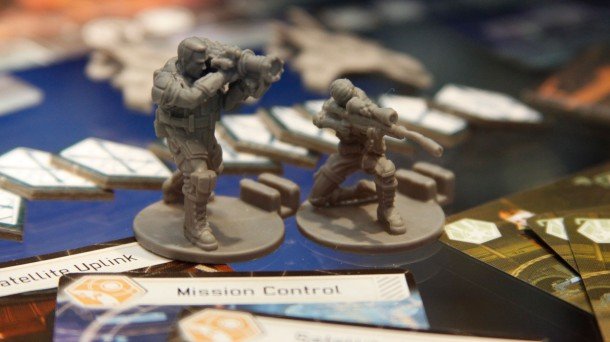
Written by Julian Murdoch
Most board/videogame crossovers are terrible, so it was with a healthy amount of skepticism that I sat down at GenCon 2014 in Indianapolis this weekend to play XCOM: The Board Game , a coop strategy game due later this year from Fantasy Flight Games.
Fantasy Flight has a small pocket industry making these crossover attempts: several runs at the World of Warcraft license, A Gears of War game, even a game based on the world of Doom . Most of the time, the theme of the videogame seems like a weird bolt-on to the cardboard version, both watering down what might be good gameplay mechanics and failing to create a meaningful connection to original game. XCOM: The Board Game avoids both of these traps, both delivering a new, fun coop experience and conjuring up the XCOM world in interesting ways.
It's worth noting that when XCOM: Enemy Unknown hit the PC in 2012, many reviews pointed out that core tactical gameplay was actually prototyped as a boardgame before being brought digital. XCOM: The Boardgame has nothing to do with that tactical miniatures (video)game we all lost countless hours too.
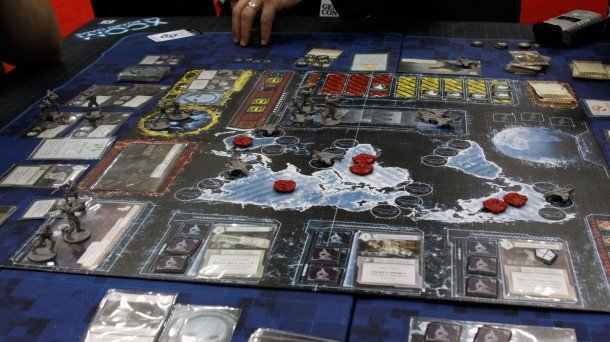
That's good news. Eric Lang, the designer of the upcoming digital/boardgame hybrid, put it this way: “Why would we try to replicate that exact experience,” he said, sitting across the plastic counters and cardboard chits that define the boardgame experience. “It already exists. We all played it. So we pulled the camera way back and put you in charge.”
The core conceit of XCOM: The Board Game is precisely that. In the video game version, most of the gameplay happens at the ground level, occasionally pulling out for a brief “geoscape” perspective. In the board game, you sit above the geoscape level, the big-boss of all. Each player assumes one or more key roles: Commander, Squad Leader, Chief Scientist, and Central Officer. Each role has its own tasks to accomplish, working together to defeat an incoming alien invasion: assigning ground troops, interceptors, and satellites to defend planet earth, researching technologies, salvaging wreckage, and completing critical missions to repel the invading sectoids, floaters, and the rest of the XCOM menagerie.
As a cooperative boardgame, it shares much in common from games like Z-Man Games' Pandemic, which assigns each player at the table a critical role in achieving a common objective against the game itself.
The biggest gaming news, reviews and hardware deals
Keep up to date with the most important stories and the best deals, as picked by the PC Gamer team.
- The Commander sends interceptors to shoot down incoming UFOs and manages the budget, allocating cash to all of the other players. Everything in the game costs money, and money is always scarce. The commander will never be able to give everyone all the money they need.
- The Chief Scientist researches new technologies that act as buffs for other members of the team using card game mechanics. Each other player has buffs that can provide enormous benefits, but she only has so many scientists to deploy, and more scientists cost more money.
- The Squad Leader assigns specialist troops (assault, sniper, special ops) to both defend XCOM home base and achieve the missions required to actually win the game. But troops get killed in combat, and recruiting new ones or leveling them up costs money too.
- The Central Officer manages satellites and communications infrastructure. But the enemy is always targeting satellites, and new ones are expensive.
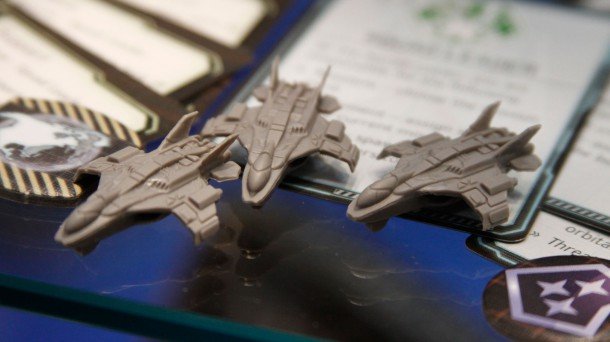
Each turn, each member has critical tasks to accomplish, and as a team, there are limited resources available to tackle the ever-changing crises which spread panic to the continents of the world. Too much panic, and the game is lost. Successful resource allocation requires real team communication and collective decision making.
But it's the Central Officer that sets the game apart. Instead of a traditional fixed turn order (I go, you go, the game goes), the Central Officer uses an app (iOS, or browser-based) to tell each team member what to do, when, and to relay the new information that comes in from the computer controlled AI. She also manages the satellite network to make sure that the best possible information is coming into the team. And it all happens on a timer.
Here's how it worked in practice, in my demo game:
“Commander, assign your interceptors. You have 15 seconds.”
Africa's about to fall into panic. Europe's no better. I have six inbound UFOs, and six interceptors, but I'm short on cash. If I move to defend, I'll have nothing to give my ground troops, who are repelling a base-invasion at XCOM HQ. And the Science Officer won't shut up about wanting to get more salvage.
“Five seconds!” screams my Central Officer.
I let Africa fall, assigning three interceptors to Europe.
“Done!” I cry. He presses a button on the iPad next to me. “Squad Leader, Defend the Base! You have 13 seconds.”
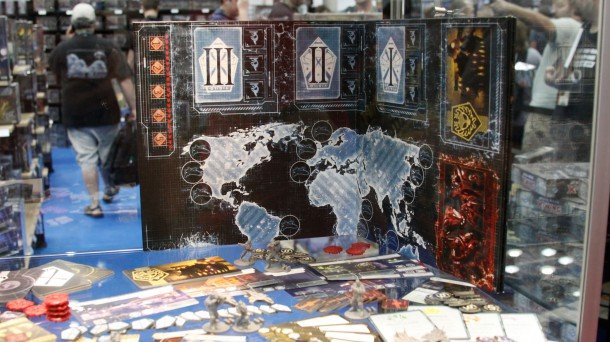
Time itself is the most critical resource. If the Commander (me, in our demo) takes too long, there are consequences. If anything goes wrong—like losing satellites or letting a continent fall into chaos—there are consequences. Sometimes the consequences are traditional boardgame consequences—fail a few dice rolls when trying to defend XCOM base, and your soldiers die. Fail to research a new technology often enough and your scientists have to take a turn off and think about what they've done.
But because the AI for the game is in the App, both time and information are part of those consequences too. After our failure in Africa, the next round had us assigning resources before we even knew where the UFOs were going to land. After running over time last turn, the Squad Leader, forced to decide between three missions to pursue, only gets 10 seconds to read the mission cards and decide, instead of 25 seconds.
And just like that, the game goes from strategic allocation and resource management to real time panic. The irony here is that this is unique in the XCOM universe. XCOM, after all, is a turn-based strategy game. A safe haven for people who don't like the stress of managing a build order in StarCraft 2 or getting a skillshot just right in League of Legends.
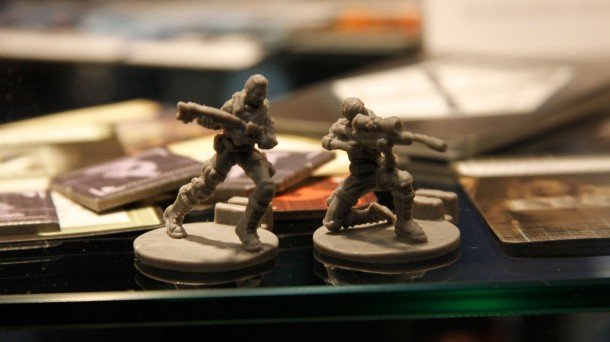
This is the genius of XCOM: The Board Game. It uses an app to change the very structure of the game (Do well, and you'll get critical information before you have to act. Do poorly, and you're flying blind), and it adds an element of real-time panic to what would otherwise be a fairly staid resource and strategy design.
This, it turns out, was the entire point: to stress you the heck out while you're trying to save the world. “Making decisions with limited information and limited time is what brings out stress,” explains Lang. “Real time is the best way to do that.” But using a sand-timer just doesn't cut it. “An App feels really impersonal, it actually feels actually sinister. When the app pings you, that sound effect starts stressing you out.”
By turn three of our demo, I'd failed to allocate resources effectively—with time being our most critical resource of all. And the earth was lost.
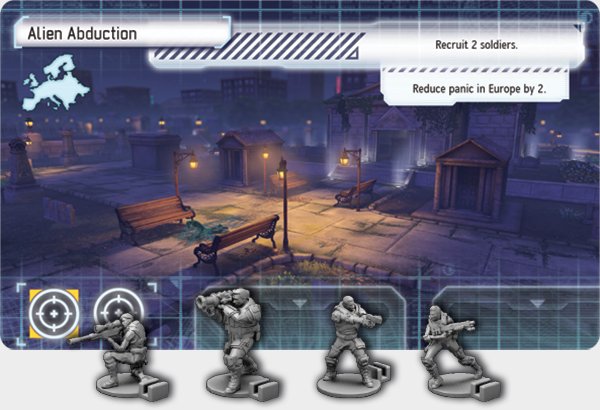
XCOM: The Board Game works as a boardgame for two reasons. The first, obviously, is it's connection to a beloved strategy videogaming franchise. The second is it's integration of a digital component. It will be easy for crufty grognards to immediately dismiss that as a “gimmick” designed to appeal to people who aren't “real” boardgamers—a comment I heard more than once on the floor of GenCon.
But XCOM: The Board Game is doing something that happens all too rarely in board games—it's actually innovating. I only got to play once—the line for demos ran around the Fantasy Flight Games booth all weekend long—but I will for sure be playing many, many times again, when it's out later this year for $60.
PC Gamer is the global authority on PC games—starting in 1993 with the magazine, and then in 2010 with this website you're currently reading. We have writers across the US, Canada, UK and Australia, who you can read about here.


